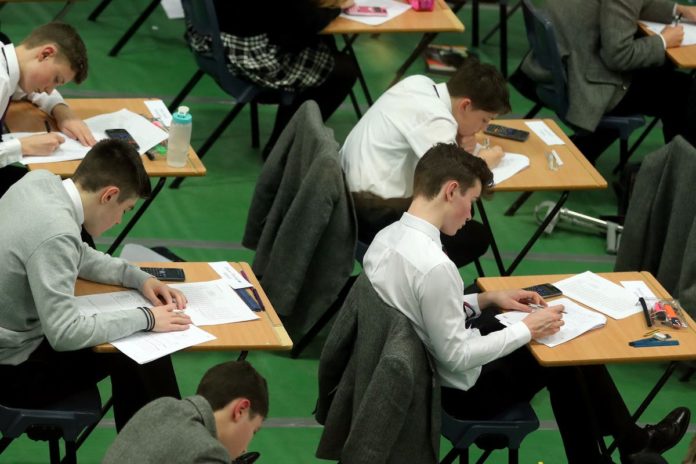Support truly
independent journalism
Our mission is to deliver unbiased, fact-based reporting that holds power to account and exposes the truth.
Whether $5 or $50, every contribution counts.
Support us to deliver journalism without an agenda.
The proportion of A-level entries awarded top grades is up on last year, national figures show, but the inequality in results between independent schools and comprehensives in England has widened.
Hundreds of thousands of students received their A-level results on Thursday morning, with more than a quarter (27.8 per cent) of UK entries awarded an A or A* grade. This is an increase of 0.6 percentage points on last year, when 27.2 per cent achieved the top grades.
Excluding 2020 to 2022, when students saw inflated grades during the pandemic, this represents the highest proportion of A* grades awarded since they were first handed out in 2010. But the overall pass rate – the proportion of entries graded A* to E – has fallen to 97.2 per cent this year, which is lower than last year (97.3 per cent) and the pre-pandemic year of 2019 (97.6 per cent).
The latest statistics also show that the attainment gap between independent schools and comprehensives in England has increased compared with last year. The attainment gap measures the educational outcomes of children from different backgrounds and schools.
Some 49.4 per cent of independent school candidates scored grade A or above in all subjects, compared with 22.3 per cent of those at comprehensive schools – a gap of 27.1 percentage points, the latest Ofqual figures show.
Last year, the gap was 25.4 percentage points, while in 2019 it was 24.8 percentage points.
Education secretary Bridget Phillipson has promised to “break down these barriers to opportunity” and “improve children’s life chances regardless of their background”.
Labour has pledged to end the VAT exemption for private schools to raise an estimated £1.6bn, which the party said would be used to hire 6,500 teachers in the state sector. Ms Phillipson said the plan is aimed at “driving high standards in our state schools”.
While she said private schools should be an option for parents, the education secretary said her focus is on improving state schools, which 93 per cent of children in the UK attend.
Concerns have been raised over the future of some independent schools as a result of the planned tax hike, but Ms Phillipson said issues facing schools that are struggling to survive come partly as a result of their own business choices.
She said: “Private schools are businesses that can make choices about how they manage their budgets, the level of fees that they charge, and ultimately, it’s about how attractive they are to families in terms of the numbers of students that are sent there.”
Joe Seddon, CEO of Zero Gravity, social mobility tech platform helping low-opportunity students into top universities, called for a “serious overhaul” in the university admissions system, saying it is “stacked against students from low-opportunity backgrounds”.
He said: “When it comes to university admissions, students from underperforming state schools have their grades compared to those from elite schools without any context about the challenges they’ve faced.
“How can universities judge potential if they have no sense if students achieved the same outcome from different starting points? This kind of unfairness demands a serious overhaul in how we approach university admissions to ensure every student has a fair shot.”
Congratulating those who received results this morning, Ms Phillipson said students across the country should be “be incredibly proud of what they have achieved” in the face of “huge disruption of recent years” as well as “inequality that goes hand in hand with young people’s backgrounds”.
She added: “I hope young people everywhere can celebrate their results and look forward to their next step – be that university, an apprenticeship or beginning their careers.”
The total number of students accepted on to UK degree courses has risen by 3 per cent on the same point last year, with 425,680 taking up places so far, initial figres from Ucas show.
Ucas said 82 per cent of all applicants have gained a place at their first choice university or college, which is up from 79 per cent last year.
But the education secretary said there are “plenty of opportunities” for those students who fall short on results day.
She told Sky News: “For those young people who get what they need and move on to their destination of choice, that’s brilliant.
“For those who perhaps fall slightly short, there are lots of options out there. There are lots of people that can be there to provide advice and support, whether that’s the school or college, Ucas through clearing, or the National Career Service.
“So I want to wish them all the very best, but to reassure them that there are plenty of opportunities that are there.”
More follows on this breaking news story….


